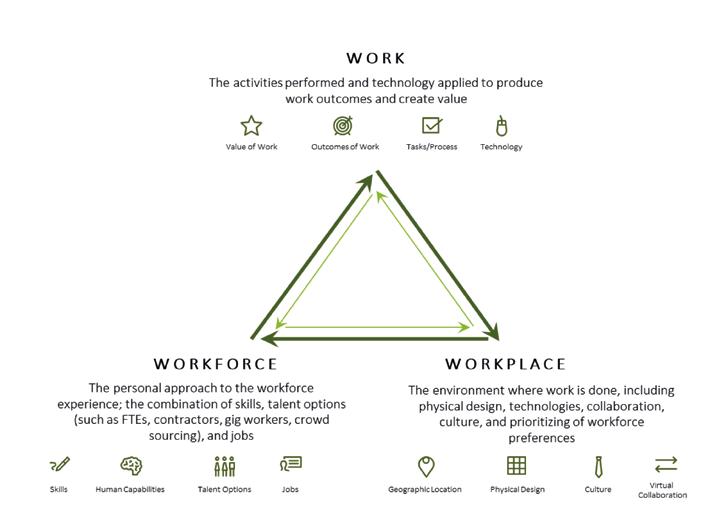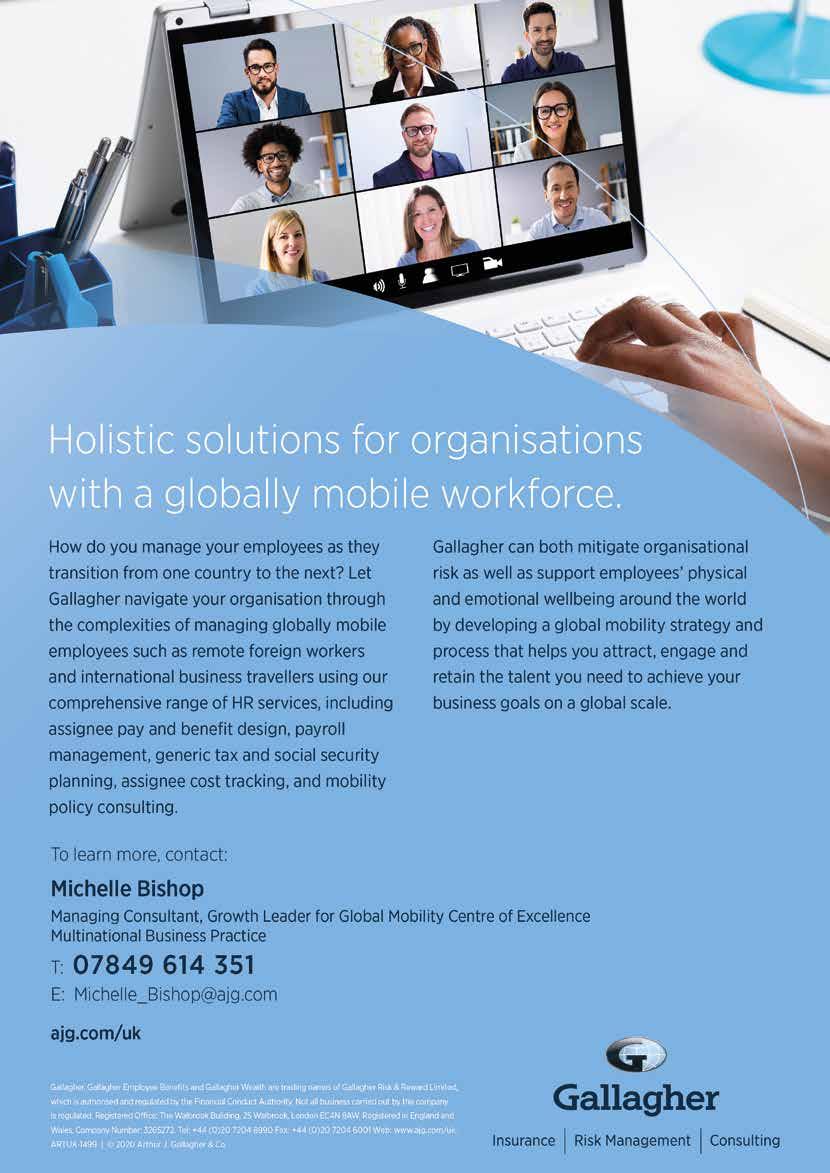
9 minute read
Cultural Adaptation: Is It Mission Critical In The ‘New Normal’ International Work Arrangements?
As we move into a new decade, organisations and governments are coming to terms with surviving and adapting to new opportunities and challenges in both emerged and emerging markets. Organisations are increasingly drawing on diverse talent from new sources on a global basis, yet, paradoxically, governments seek to pursue more nationalist agendas. As the current COVID-19 pandemic is only likely to add greater complexity to these trends, organisations will seek to fulfil their objectives, while mitigating any risks in this ‘new normal’. • Subsequently, traditional Global Mobility models are shifting to address different business and talent agendas • Even with a variety of policies available, how effectively do organisations ensure that their employees and their families are culturally and emotionally prepared for life in a new arrival country?
• Historically, organisations have particularly used cultural and language development programmes for those traditional international assignments that are expected to have critical, strategic impact for the host entity. • Often, the decision is based on the leadership acknowledgement that this is a sound investment, rather than a soft cost that can be eliminated from budget. How much more critical though, will this be in a post COVID-19 environment as new work arrangements emerge, with a continuum of modified assignment and relocation provisions - including virtual assignments - as there are so many more aspects to consider?
The Growth Of Differential Investment In Mobility Programmes Prior to the COVID-19 outbreak, the use of a wide variety of international assignments reflected the key strategic direction multinational organisations were continuing to follow to manage global activity. Undoubtedly, this strategy is likely to shift significantly as the world comes out of lockdown; most likely with a rise of virtual assignments over more traditional options. How these will be managed post-COVID-19 is still to be determined, with this fluid picture mostly likely to continue evolving over the next 12-24 months.
Does Familiarity Breed Contempt? We have become acclimatised to often living in a volatile, uncertain world. Regardless, this is certainly not a precursor to a slowdown in the war for talent. We live in a global village where social media would make us believe that, via shared content found on the internet, in videos and documentaries, we all have a common understanding of cultures, language and shared values. However, the opposite is probably closer to the truth, exacerbated by the increasing number of nationalistic agendas. In the Global Mobility industry, this remains ever clear, as policies are often adapted for hardship, or challenging locations. Fig. 1 - Most challenging assignment destinations
#1
#2 USA
China
#3 India Source: Extract from Santa Fe Relocation GMS 2019 p.56
Fig. 2 - Why are destinations challenging? Top four challenges.
#1
#2
#3
#4 Cultural Differences
Immigration Complications Concerns About Personal Security And Safety Language Difficulties 40%
38%
34%
34%
Source: Santa Fe Relocation GMS 2019 Fig 34 p.56: Why are these destinations most challenging
In the midst of this, organisations are seeking to: re-balance how they attract people with the right future and culture-proofed skills and competencies, nurture global and local teams that associate with organisational culture, and embed new workplace systems and processes that leverage Artificial Intelligence (AI) and digital platforms that drive workplace analytics. • With the advent of more virtual working, the ability to interculturally integrate with virtual, global teams will become absolutely vital • This is never truer than in today’s global talent market, brokered by organisations’ talent teams in their insatiable quest for the next ‘super’ talent, who will be globally mobile and able to integrate seamlessly into local communities, embrace new work-life experiences and deliver day-one business outcomes.
The Assignee Lifecycle Unarguably, an international assignment is defined by numerous stressors. These include the uncertainly and shifting demands that come with a new role while having to adapt to a new culture and way of life (and potentially a new language).
Additionally, there is the pressure that comes with ensuring the accompanying family settle in and adapt quickly and adequately, without the usual support network and social outlets previously in place at home.
All this must occur while dedicating the additional commitment of time and energy necessary to face the increased pressures to succeed. Resultingly, assignment failure becomes a real and present danger, creating both significant financial and strategic risks for the organisation.
How many organisations experience assignment failure, resulting in unachieved objectives and or early return?
Physical And Mental Wellbeing: A Duty Of Care Additional risks for assignees and family members extend beyond the failure of meeting organisational goals, and include their personal wellbeing; physically, emotionally and mentally, regardless of length of assignment, or whether ‘live’ in person, or virtually.
With the added risk COVID-19 places on international assignments, ensuring a Duty of Care in any assignment policy - and throughout the course of the entire assignment, whatever that assignment looks like - now takes precedence over other considerations.
Preparation is recommended at every stage of the assignee lifecycle in order to enable talent to succeed, which may also include incorporating adjacent services and training support.
In response to ‘How Global Mobility prepares employees to understand host location norms’*, the highest approach: 34% Employees are required to self-manage their own cultural preparation.
*Source: Santa Fe Relocation GMS 2019 Fig. 36 p.61
The Good News Fortunately, there are ways to mitigate these risks, while equally supporting the objectives of the assignment, as well as the employee and family. Such targeted training - whether delivered pre-departure or post-arrival,
Interestingly, these solutions are readily available and typically at a cost less than 2% of a traditional long-term placement: assignment-related intercultural and language training.
live face-to-face or virtually, have shown a significant ROI, helping to mitigate the risks and ensure assignment success.
Why Is Cultural Adaptation In Managing Virtual Assignments Critical? Virtual working has, for some, been their normal work methods for a long time. For others, it has been forced upon them as a result of the coronavirus pandemic. Acknowledging - but not focusing - on the compliance aspects of potential immigration, employee taxation and corporate permanent establishment risks, we have highlighted the personal aspect of international assignments, whether live, or virtual.
Throughout this article, we have considered the challenges and opportunities of investing in intercultural training for both internationally mobile employees, their families, as well as potentially their local counterparts. As international work arrangements shift and organisations re-think their talent investment strategies, intercultural effectiveness will become even more business critical.
There are many familiar, and new, social media applications that enable teams to visually interact and socialise. However, the success of the team will, ultimately, be based on the dynamics of effective team collaboration, underpinned by recognising the cultural filters in place and demonstrating pluralistic empathy. How many organisations are considering this as they opt for virtual rather than physical assignments?
Summary We have highlighted the case for investing in intercultural preparation and integration between all stakeholders. As the impact of the return to the ‘new normal context’ in global work arrangements evolves, it will be critical to ensure that both preparation protocols reflect host country adaptation–for social and work arrangements, as well as in the methods used to prepare talent for their new roles and lives. • Within Global Mobility networks, there are increasingly frequent discussions around more flexible international work arrangements; increased numbers of split family assignments, virtual assignments, smarter use of short-term assignments, rotational assignments and hosted assignments, where the ’international’ remains in their home location! • What is absolutely critical in all of this, will be a stronger focus on the duty of care of employees, to recognise the additional pressures and need to support the wellbeing and security of employees who will either - voluntarily or involuntarily - mobilise to thrive in these uncertain and variable times • Now is the time, if not done so already, to reflect on optimising your relocation management employee value proposition through more agile practices, re-imagining cultural integration for more virtual working - not only internally but also in client interactions • Human ingenuity will continue to adapt but, how more effective could it be with enhanced intercultural development?
Will this also impact the talent selection processes by use of intercultural adaptability assessments - which many corporations already embed in their process? Latterly, talent selection has been based on who is available with the required skill sets, easy to deploy and able to hit the ground running. Differential investment in international talent decisions, for some organisations, will become less likely to be decided through informal networks and cost estimates. Recognising the full investment required to deliver a true competitive advantage will become more thoughtful—and by including intercultural training, the difference between success and failure.
References and extracts from:
Santa Fe Relocation’s white paper: ‘Cultural adaptation: Is it mission critical in the ‘new normal’ international work arrangements?
Download the full white paper: www. santaferelo.com/en/mobility-insights/
white-papers/cultural-adaptation-isit-mission-critical-in-the-new-normalinternational-work-arrangements/
Download: Santa Fe Relocation’s Global Mobility Survey 2019 ‘REVISION: Mobility through the looking glass’: www. santaferelo.com/en/mobility-insights/ global-mobility-survey/
Visit www.santaferelo.com for more information.
JOHN RASON Group Head of Consulting, Santa Fe Relocation. Recognised as a thought leader and speaker on strategic international HR, talent management and Global Mobility, John has 15 years of global consultancy experience. Having previously held senior HR leadership roles in numerous global businesses across a range of industry sectors, John now works with global organisations to create value and improve the structure of Global Mobility programmes; focusing on aligning strategic objectives with operational delivery. John can be contacted at: john.rason@santaferelo.com.

DANIEL WERDER Group Head of Client Development, Santa Fe Relocation. A seasoned professional with more than twenty years Global Mobility industry experience, in a variety of roles focussing on both operations and account management. Daniel has particular expertise in the intercultural and communication fields and has worked for large American and European Relocation Management organisations. Having lived and worked internationally for many years, he is passionate about sharing the impact of culture on international assignees as well as their organisations. Daniel can be contacted at daniel.werder@santaferelo.com.
The Global HR Conferences 2021
FOR IN-HOUSE GLOBAL HR PROFESSIONALS ONLY










